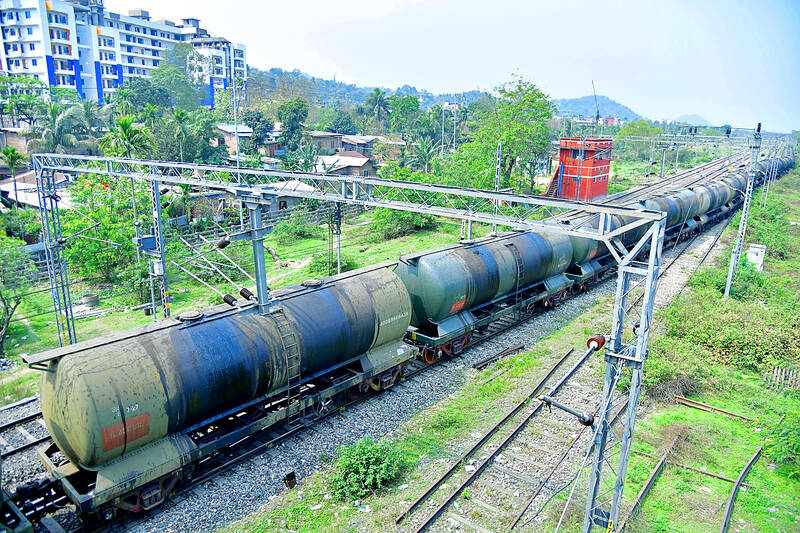The EU should crack down on India reselling Russian oil into Europe as refined fuel, including diesel, EU High Representative for Foreign Affairs and Security Policy Josep Borrell said in an interview with the Financial Times.
India has in the past year emerged as a top buyer of Russian oil following Moscow’s invasion of Ukraine in February last year.
Access to cheap Russian crude has boosted output and profits at Indian refineries, enabling them to export refined products competitively to Europe and take a bigger market share.

Photo: AFP
Borrell told the newspaper that he would raise the issue with Indian Minister of External Affairs Subrahmanyam Jaishankar in their meeting set for yesterday.
“If diesel or gasoline is entering Europe ... coming from India and being produced with Russian oil, that is certainly a circumvention of sanctions and member states have to take measures,” the EU’s chief diplomat said.
“That India buys Russian oil, it’s normal... But if they use that in order to be a center where Russian oil is being refined and by-products are being sold to us ... we have to act,” Borrell said.
Indian refiners, which rarely bought Russian oil previously due to high transport costs, imported 970,000 to 981,000 barrels per day from Russia in fiscal 2022-2023 (April to March), accounting for more than one-fifth of the country’s overall fuel imports.
Russia’s largest oil producer PJSC Rosneft Oil Co and top Indian refiner Indian Oil Corp have also signed a term deal to substantially increase and diversify oil grades delivered to India.
Ship-tracking data from Kpler showed that Reliance Industries Ltd and Nayara Energy Ltd were the key exporters of refined fuels and buyers of Russian oil.
India typically exported an average of 154,000 barrels per day of diesel and jet fuel to Europe before Russia’s invasion of Ukraine. However, that has increased to 200,000 barrels per day after the EU banned Russian oil products imports from Feb. 5 this year, Kpler data showed.
Any mechanism to stem the flow of Russian oil would need to be implemented by the national authorities, Borrell told the Financial Times, suggesting that the EU could target buyers of Indian refined fuels which it believes are derived from Russian crude.
“If they sell, it is because someone is buying, and we have to look at who is buying,” he said.

Taiwan Semiconductor Manufacturing Co (TSMC, 台積電) would not produce its most advanced technologies in the US next year, Minister of Economic Affairs J.W. Kuo (郭智輝) said yesterday. Kuo made the comment during an appearance at the legislature, hours after the chipmaker announced that it would invest an additional US$100 billion to expand its manufacturing operations in the US. Asked by Taiwan People’s Party Legislator-at-large Chang Chi-kai (張啟楷) if TSMC would allow its most advanced technologies, the yet-to-be-released 2-nanometer and 1.6-nanometer processes, to go to the US in the near term, Kuo denied it. TSMC recently opened its first US factory, which produces 4-nanometer

GREAT SUCCESS: Republican Senator Todd Young expressed surprise at Trump’s comments and said he expects the administration to keep the program running US lawmakers who helped secure billions of dollars in subsidies for domestic semiconductor manufacturing rejected US President Donald Trump’s call to revoke the 2022 CHIPS and Science Act, signaling that any repeal effort in the US Congress would fall short. US Senate Minority Leader Chuck Schumer, who negotiated the law, on Wednesday said that Trump’s demand would fail, while a top Republican proponent, US Senator Todd Young, expressed surprise at the president’s comments and said he expects the administration to keep the program running. The CHIPS Act is “essential for America leading the world in tech, leading the world in AI [artificial

REACTIONS: While most analysts were positive about TSMC’s investment, one said the US expansion could disrupt the company’s supply-demand balance Taiwan Semiconductor Manufacturing Co’s (TSMC, 台積電) new US$100 billion investment in the US would exert a positive effect on the chipmaker’s revenue in the medium term on the back of booming artificial intelligence (AI) chip demand from US chip designers, an International Data Corp (IDC) analyst said yesterday. “This is good for TSMC in terms of business expansion, as its major clients for advanced chips are US chip designers,” IDC senior semiconductor research manager Galen Zeng (曾冠瑋) said by telephone yesterday. “Besides, those US companies all consider supply chain resilience a business imperative,” Zeng said. That meant local supply would

Servers that might contain artificial intelligence (AI)-powering Nvidia Corp chips shipped from the US to Singapore ended up in Malaysia, but their actual final destination remains a mystery, Singaporean Minister for Home Affairs and Law K Shanmugam said yesterday. The US is cracking down on exports of advanced semiconductors to China, seeking to retain a competitive edge over the technology. However, Bloomberg News reported in late January that US officials were probing whether Chinese AI firm DeepSeek (深度求索) bought advanced Nvidia semiconductors through third parties in Singapore, skirting Washington’s restrictions. Shanmugam said the route of the chips emerged in the course of an